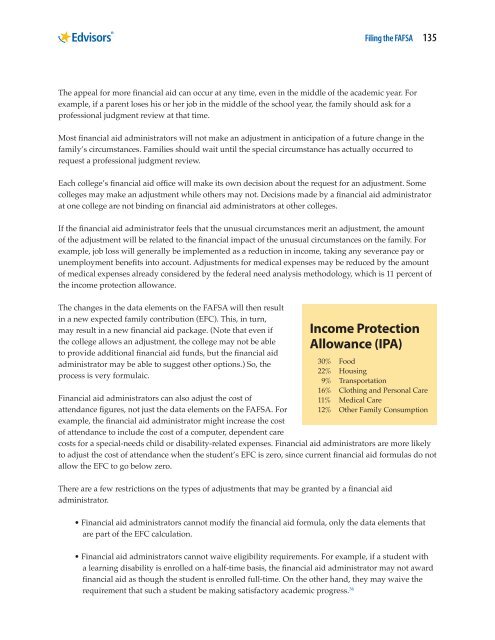filing-the-fafsa-2015-2016-edition
filing-the-fafsa-2015-2016-edition
filing-the-fafsa-2015-2016-edition
You also want an ePaper? Increase the reach of your titles
YUMPU automatically turns print PDFs into web optimized ePapers that Google loves.
Filing <strong>the</strong> FAFSA 135<br />
The appeal for more financial aid can occur at any time, even in <strong>the</strong> middle of <strong>the</strong> academic year. For<br />
example, if a parent loses his or her job in <strong>the</strong> middle of <strong>the</strong> school year, <strong>the</strong> family should ask for a<br />
professional judgment review at that time.<br />
Most financial aid administrators will not make an adjustment in anticipation of a future change in <strong>the</strong><br />
family’s circumstances. Families should wait until <strong>the</strong> special circumstance has actually occurred to<br />
request a professional judgment review.<br />
Each college’s financial aid office will make its own decision about <strong>the</strong> request for an adjustment. Some<br />
colleges may make an adjustment while o<strong>the</strong>rs may not. Decisions made by a financial aid administrator<br />
at one college are not binding on financial aid administrators at o<strong>the</strong>r colleges.<br />
If <strong>the</strong> financial aid administrator feels that <strong>the</strong> unusual circumstances merit an adjustment, <strong>the</strong> amount<br />
of <strong>the</strong> adjustment will be related to <strong>the</strong> financial impact of <strong>the</strong> unusual circumstances on <strong>the</strong> family. For<br />
example, job loss will generally be implemented as a reduction in income, taking any severance pay or<br />
unemployment benefits into account. Adjustments for medical expenses may be reduced by <strong>the</strong> amount<br />
of medical expenses already considered by <strong>the</strong> federal need analysis methodology, which is 11 percent of<br />
<strong>the</strong> income protection allowance.<br />
The changes in <strong>the</strong> data elements on <strong>the</strong> FAFSA will <strong>the</strong>n result<br />
in a new expected family contribution (EFC). This, in turn,<br />
may result in a new financial aid package. (Note that even if<br />
<strong>the</strong> college allows an adjustment, <strong>the</strong> college may not be able<br />
to provide additional financial aid funds, but <strong>the</strong> financial aid<br />
administrator may be able to suggest o<strong>the</strong>r options.) So, <strong>the</strong><br />
process is very formulaic.<br />
Financial aid administrators can also adjust <strong>the</strong> cost of<br />
attendance figures, not just <strong>the</strong> data elements on <strong>the</strong> FAFSA. For<br />
example, <strong>the</strong> financial aid administrator might increase <strong>the</strong> cost<br />
of attendance to include <strong>the</strong> cost of a computer, dependent care<br />
Income Protection<br />
Allowance (IPA)<br />
30% Food<br />
22% Housing<br />
9% Transportation<br />
16% Clothing and Personal Care<br />
11% Medical Care<br />
12% O<strong>the</strong>r Family Consumption<br />
costs for a special-needs child or disability-related expenses. Financial aid administrators are more likely<br />
to adjust <strong>the</strong> cost of attendance when <strong>the</strong> student’s EFC is zero, since current financial aid formulas do not<br />
allow <strong>the</strong> EFC to go below zero.<br />
There are a few restrictions on <strong>the</strong> types of adjustments that may be granted by a financial aid<br />
administrator.<br />
• Financial aid administrators cannot modify <strong>the</strong> financial aid formula, only <strong>the</strong> data elements that<br />
are part of <strong>the</strong> EFC calculation.<br />
• Financial aid administrators cannot waive eligibility requirements. For example, if a student with<br />
a learning disability is enrolled on a half-time basis, <strong>the</strong> financial aid administrator may not award<br />
financial aid as though <strong>the</strong> student is enrolled full-time. On <strong>the</strong> o<strong>the</strong>r hand, <strong>the</strong>y may waive <strong>the</strong><br />
requirement that such a student be making satisfactory academic progress. 36


